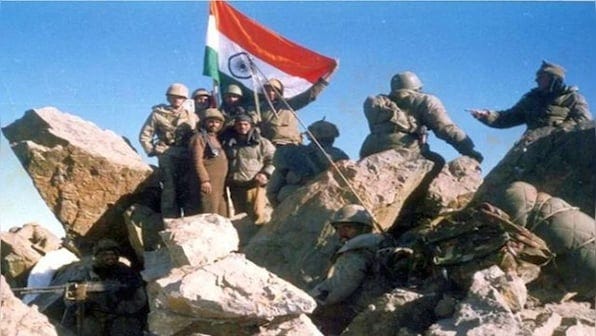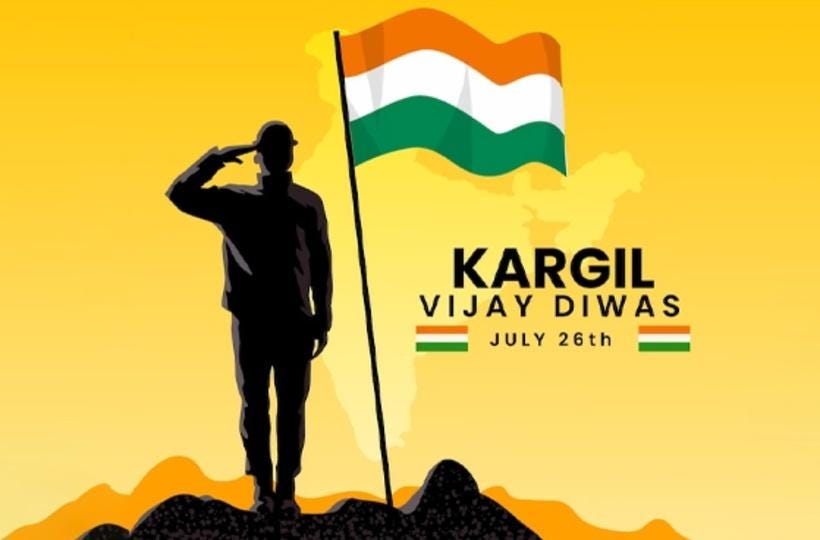Kargil Intrusion: Did PM Vajpayee Rebuff Clinton's Mediation that Offered Pakistan a Safe and 'Honorable' Retreat?
Morale of Indian Armed Forces, who guard frontiers of the nation all conditions, must take precedence over the instinct to “protect” a few black sheep within an otherwise professional Punjab Police.
Kargil Intrusion: Did PM Vajpayee Rebuff Clinton's Mediation?
The 1999 Kargil War was not merely a tactical military episode but a defining moment in India’s strategic doctrine and diplomatic posture. Just months before the conflict, Prime Minister Atal Bihari Vajpayee had extended a historic olive branch to Pakistan through the Lahore Bus initiative, signaling a desire for peace and reconciliation. Yet, Pakistan’s military betrayed this goodwill by orchestrating a covert incursion into the Kargil-Dras heights, violating the sanctity of the Line of Control (LoC). As Pakistani forces and militants occupied key positions, U.S. President Bill Clinton intervened to de-escalate the crisis, purportedly offering Pakistan a “safe and honorable” retreat. Vajpayee’s government, however, stood resolute, rejecting third-party mediation and insisting on unconditional Pakistani withdrawal. In retrospect, the question remains: Did PM Vajpayee rebuff Clinton’s mediation that offered Pakistan a safe and honorable retreat—or did India simply refuse to reward aggression with diplomacy?
The Kargil Incursion: A Calculated Gamble by Pakistan
In the winter of 1999, Pakistan’s Northern Light Infantry, aided by militants, stealthily occupied strategic positions in the Kargil-Dras sector. This surprise operation, orchestrated by General Pervez Musharraf without the full knowledge of Pakistan's civilian leadership, sought to internationalize the Kashmir dispute by redrawing territorial realities. Islamabad initially denied involvement, characterizing the intruders as “freedom fighters,” but captured Pakistani soldiers and seized documents exposed the true nature of the incursion.
India’s Calibrated Military and Diplomatic Response
India responded with Operation Vijay—a high-altitude military campaign combining infantry assaults and artillery strikes. Importantly, India confined its operations within its own territory, avoiding escalation beyond the LoC. This restraint served a dual purpose: tactically limiting the conflict and diplomatically reinforcing India’s image as the aggrieved party acting in self-defense.
Washington’s Proposal and India’s Strategic Refusal
Amid rising global concern, President Clinton met Pakistani Prime Minister Nawaz Sharif on July 4, 1999. The outcome—the Washington Accord—suggested Pakistan’s willingness to withdraw. However, India viewed the accord with suspicion. Three concerns guided New Delhi’s stance:
Credibility: Given Pakistan’s past violations of accords, India demanded verifiable action over verbal assurances.
Sovereignty: Accepting U.S. mediation threatened India’s long-held rejection of external interference in the Kashmir issue.
Tactical Momentum: By July, Indian forces had reclaimed major positions like Tiger Hill, strengthening the argument for total battlefield recovery.
The “No Negotiations Under Fire” Doctrine
India’s External Affairs Minister Jaswant Singh articulated a clear position—there would be no talks until Pakistan vacated all occupied positions. This echoed lessons from past conflicts, especially the 1965 war, where international pressure had resulted in a perceived status quo ante. Military commanders argued that halting operations could give Pakistani forces time to regroup, prolonging the conflict and complicating a full withdrawal.
Domestic Political Considerations and Public Sentiment
Prime Minister Vajpayee’s coalition government was navigating complex domestic terrain. The BJP’s nationalist base demanded a firm military response, especially after the perceived betrayal of the Lahore Declaration. Coalition partners, wary of escalating casualties, exerted political pressure. Meanwhile, live news coverage stirred public opinion, portraying Indian soldiers’ heroism and reinforcing demands for total victory. The opposition, led by Sonia Gandhi, warned against repeating a “Tashkent-style compromise.”
Strategic and Military Calculations on the Ground
Indian planners believed that time was on their side. As winter approached, Pakistani positions became increasingly vulnerable. India’s logistical advantages—shorter supply lines and artillery support—allowed sustained pressure. Despite nuclear saber-rattling, both sides appeared to understand the limits of escalation, with deterrence holding firm even amid heavy combat.
Diplomatic Engagement Without Concession
Though India appreciated Clinton’s efforts to nudge Pakistan toward retreat, it refused American suggestions to:
Curb air operations
Accept UN observers
Join trilateral talks on Kashmir
Indian diplomats maintained that agreeing to any of these would legitimize Pakistan’s aggression and undermine the Simla Agreement’s bilateral dispute resolution framework.
Winning the Information War
India’s media and diplomatic strategy was unusually robust. Evidence including intercepted communications, identity documents, and satellite imagery was shared with global actors. These efforts bore fruit, as world opinion, including the G8 and ASEAN, shifted decisively in India’s favor, backing its demand for a full and unconditional Pakistani withdrawal.
Institutionalizing the Kargil Experience
Post-conflict, India took decisive steps to avoid repetition:
Troops were permanently stationed at high-altitude posts previously vacated in winter.
Defense modernization accelerated, focusing on precision munitions and surveillance assets.
Strategic doctrine evolved toward rapid mobilization options under the "Cold Start" concept.
Pakistan’s Internal Repercussions
For Pakistan, the failed operation had severe consequences. General Musharraf’s power play led to the ousting of Prime Minister Sharif in a coup later that year. Internationally, Pakistan faced diplomatic isolation and U.S. sanctions due to its nuclear status and the failure of the Kargil mission.
Reflections on Accountability: The Kargil Review Committee Report
The Kargil Review Committee, led by K. Subrahmanyam, identified a significant failure in intelligence coordination as a primary cause of the conflict. Despite this, the top brass of the Indian Army was never held accountable for the initial lapses that allowed Pakistani forces to intrude into Indian sovereign territory. While we salute the officers and jawans who laid down their lives in defense of the nation, it remains a stark reality that those responsible for ensuring the security of our borders were not brought to task. This oversight underscores the need for robust accountability mechanisms within India's defense establishment to prevent similar strategic surprises in the future.
Summing Up: Rebuffing Mediation to Reclaim Initiative—and Defend Institutional Morale
In retrospect, India's rejection of facilitated Pakistani withdrawal was driven by a matrix of factors—strategic momentum, political necessity, and the larger imperative of national credibility. While President Clinton’s diplomacy helped defuse the crisis, it could not override India's firm belief that only battlefield success would reshape Pakistan’s risk calculus. The legacy of the Kargil War established enduring red lines in Indian security policy: no third-party mediation, no concessions under duress, and no compromise on territorial integrity.
And yet, as we reflect on this legacy, a troubling contradiction stares us in the face. Today, the wife of a serving Colonel of the Indian Army finds herself battling the system—moving from door to door, seeking justice for her husband who was brutally assaulted by an officer of the Punjab Police in Patiala. It compels us to ask: Have we forgotten what truly underpins our national security?
The morale and dignity of our Armed Forces—who stand guard at unforgiving heights and face mortal peril to protect the Republic—must weigh far more heavily than the impulse to shield a few errant officials within an otherwise professional state police force. Upholding the honor of our soldiers cannot be a selective principle.
Did Prime Minister Vajpayee rebuff Clinton’s mediation that offered Pakistan a safe and honorable retreat? Yes—because he understood that the nation’s long-term security rests not in temporary deals or diplomatic face-savers, but in the unwavering trust between a Republic and those who defend it. As we recall that courageous stand, we are reminded once more: the sacrifice, integrity, and morale of our soldiers must never be compromised—neither at the border, nor within.
Commemorating 25th Anniversary of Kargil Vijay Diwas: Honour and Reflection
Commemorating Kargil Vijay Diwas: 25th Anniversary



